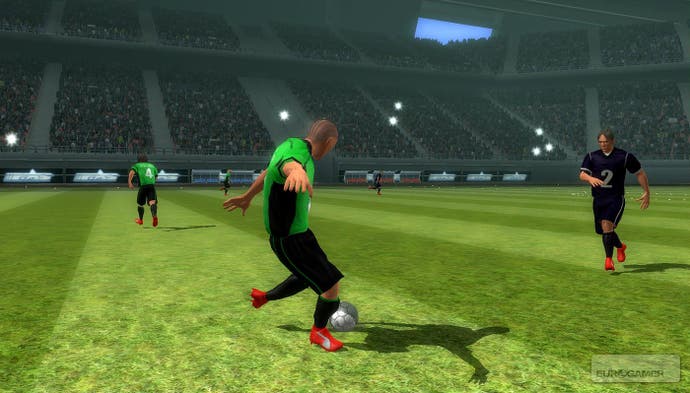Football Superstars
A game of two halves.
It happens about halfway through our brief but eye-opening ten-minute go on Football Superstars: it's like a switch has flicked in our head. We carry on playing more or less as we were (badly), but our perception of the match, and our tactical approach to it, have changed completely. A minute ago, we were playing a videogame. Now, we're playing football.
The change occurs when we instinctively understand something we rationally knew already. We're running about on the pitch not with bunch of AIs, but with a bunch of other people; the developers sat around us in Monumental Games' Nottingham offices. Only the two goalies are handled by the game server. And we're not a team; we're only players.
We start thinking about marking opposition players, positioning ourselves to receive passes, swinging the camera around to track the ball and our team-mates as we make a (badly) coordinated run on goal. The difference between Football Superstars and PES or FIFA is as wide as the gulf between Call of Duty and Command and Conquer. Or - perhaps more accurately - World of Warcraft and Warcraft III.
Football Superstars is, simply put, a free-to-play football MMO, developed by Monumental and published by a new UK-based venture called Cybersports. In the game, you create a player and play your way from three-a-side up to eleven-a-side matches, levelling up attributes and gaining skills as you go, and specialising your playing position, in rough RPG style. Matches are always played entirely by human players (with the exception of those goalies), and you can choose between unranked casual games, ranked FS Club league matches organised by the game, and player-organised leagues of player-manager clubs.

The other half of this particular game is a "lifestyle" social game and front end, where your male or female footballer/avatar can train, shop, socialise, and play dress-up. The aim of this side of the game is to acquire fame (linked to performance on the field), which grants access to ever more exclusive haunts, content and items, which bestow more fame and so on in a heady spiral of strutting, flashy, tabloid-baiting excess.
It's match-play that matters first and foremost, naturally, and it's match-play that we had a chance to sample ourselves. It may only take five minutes to make the mental leap to playing as one part of a human team, but it will take a little longer to get accustomed to Football Superstars controls. This isn't to say they aren't simple and logical, but they are a stark shift from how you're used to handling virtual football.
Monumental likens them to PC FPS controls, and indeed you do use the mouse to look around, WASD to move your player relative to the camera, and the left mouse button to select players, shoot, pass and tackle, with a targeting graphic to tell you which. Abilities are scrolled through with the mouse wheel and activated with Q and E. Most useful of all, the tab key automatically runs your player toward the ball. When it comes to passing, aiming is semi-automatic: you select the player you want to pass to and the game aims your shot ahead so he should, by rights, run straight into it.

It makes perfect sense, but it feels foreign in this context, and you shouldn't expect the razor-sharp instant reactions of an FPS. The animation routines give your player a pronounced weight and sense of inertia, making him feel a little sticky and lethargic at first when turning, and your early attempts on the ball are clumsy to say the least.
Ultimately, however, this gives the game a thoroughly convincing and satisfying physicality, and means that thinking ahead and developing sound instincts will be as important as fast reflexes to success. There is definitely a learning curve here, but early indications are that climbing it will be fun in its own right. Naturally, so will honing your teamwork, especially if you can do so with a regular group of friends. The latter will be helped along by voice chat with full surround-sound positioning.
Although the game does include levelling up, specialisation and attributes (six physical attributes, improved in gyms, and 13 football attributes, improved on the pitch) - and although you can earn special abilities, and temporary and permanent passive buffs - it's weighted slightly more towards skill than number-crunching and time-investment. Given what the game wants to achieve, this is probably wise.








